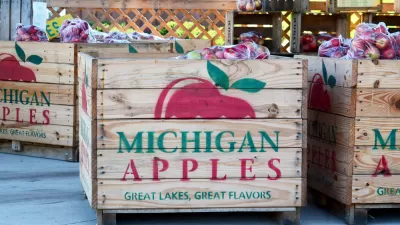By a narrow vote, Detroit's City Council has given approval for the city to sell 140 acres of vacant land to financial services business owner John Hantz for the creation of an urban agriculture project. Some are calling the deal a "land grab."

After four years of negotiations with the city, and vocal public opposition, plans by Detroit to sell 1,500 city-owned plots for $520,000 to John Hantz for the creation of his ambitious "Hantz Woodlands" project were narrowly approved by the City Council this week, reports Steve Pardo. The first phases of the project will see the demolition of structures, removal of trash, and title work (at a cost of $3.2 million) and the planting of at least 15,000 trees that "would eventually be used for commercial purposes" once the city passes an urban agriculture ordinance.
Although Mayor Dave Bing "said the project is in line with his vision of transforming vacant and underutilized parcels," Pardo notes that, "[f]oes have questioned the sale price, accused Hantz of getting special treatment and questioned the wisdom of allowing one firm to own so much land."
According to Susie Cagle, writing in Grist, the supposedly "vacant" land may not be deserted after all: "In These Times reports that about 100 people still live in the areas that Hantz plans to demolish, clean, and plant full of trees by next spring."
Despite opposition to the Hantz project, "Detroit’s community garden and urban farming scene is positively blooming, and it stands to grow even more in 2013," says Cagle. "Last week, the city’s Planning Commission approved a new zoning ordinance that would officially recognize the city’s gardens and farms, as well as create new ways forward for creating larger farms and reusing vacant buildings. The new rules would also allow for sale of the goods and produce grown. The City Council will vote on the new rules in January."
FULL STORY: 140 acres in Detroit sold to grow trees

Planetizen Federal Action Tracker
A weekly monitor of how Trump’s orders and actions are impacting planners and planning in America.

Congressman Proposes Bill to Rename DC Metro “Trump Train”
The Make Autorail Great Again Act would withhold federal funding to the system until the Washington Metropolitan Area Transit Authority (WMATA), rebrands as the Washington Metropolitan Authority for Greater Access (WMAGA).

The Simple Legislative Tool Transforming Vacant Downtowns
In California, Michigan and Georgia, an easy win is bringing dollars — and delight — back to city centers.

The States Losing Rural Delivery Rooms at an Alarming Pace
In some states, as few as 9% of rural hospitals still deliver babies. As a result, rising pre-term births, no adequate pre-term care and "harrowing" close calls are a growing reality.

The Small South Asian Republic Going all in on EVs
Thanks to one simple policy change less than five years ago, 65% of new cars in this Himalayan country are now electric.

DC Backpedals on Bike Lane Protection, Swaps Barriers for Paint
Citing aesthetic concerns, the city is removing the concrete barriers and flexposts that once separated Arizona Avenue cyclists from motor vehicles.
Urban Design for Planners 1: Software Tools
This six-course series explores essential urban design concepts using open source software and equips planners with the tools they need to participate fully in the urban design process.
Planning for Universal Design
Learn the tools for implementing Universal Design in planning regulations.
Smith Gee Studio
City of Charlotte
City of Camden Redevelopment Agency
City of Astoria
Transportation Research & Education Center (TREC) at Portland State University
US High Speed Rail Association
City of Camden Redevelopment Agency
Municipality of Princeton (NJ)




























